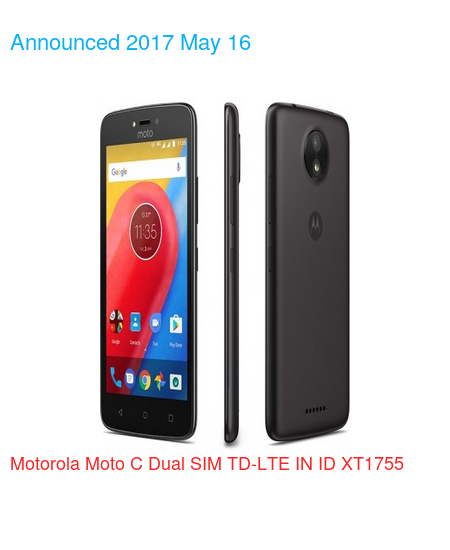| Brand | Motorola |
| Model | Moto C Dual SIM TD-LTE IN ID XT1755 |
| Released | 2017 May |
| Announced | 2017 May 16 |
| Hardware Designer | Lenovo |
| Manufacturer | Lenovo |
| Codename | Motorola Watson |
| OEM ID | M2998 |
| General Extras | Haptic touch feedback |
| Device Category | Smartphone |
| Width | 73.6 mm |
| Height | 145.5 mm |
| Depth | 9 mm |
| Dimensions | 2.90×5.73×0.35 inches |
| Mass | 154 g |
| Platform | Android |
| Operating System | Google Android 7.0 (Nougat) |
| Software Extras | Voice Command , Navigation software |
| CPU Clock | 1300 MHz |
| CPU | MediaTek MT6737, 2016, 64 bit, quad-core, 28 nm, ARM Mali-T720 GPU |
| RAM Type | LPDDR3 SDRAM |
| RAM Capacity (converted) | 1 GiB RAM |
| Non-volatile Memory Interface | eMMC 5.0 |
| Non-volatile Memory Capacity (converted) | 16 GB ROM |
| Display Diagonal | 127 mm |
| Resolution | 480×854 |
| Horizontal Full Bezel Width | 11.37 mm |
| Display Area Utilization | 64.3% |
| Pixel Density | 196 PPI |
| Display Type | Color TN-TFT LCD display |
| Number of Display Scales | 16.8M |
| Scratch Resistant Screen | Yes |
| Graphical Controller | ARM Mali-T720 |
| A/V Out | No |
| Microphone(s) | mono |
| Loudspeaker(s): | mono |
| Audio Output: | 3.5mm |
| Supported Cellular Bands | GSM850 , GSM900 , GSM1800 , GSM1900 , UMTS2100 (B1) , UMTS1900 (B2) , UMTS850 (B5) , UMTS900 (B8) , LTE2100 (B1) , LTE1800 (B3) , LTE850 (B5) , LTE2600 (B7) , LTE900 (B8) , TD-LTE2300 (B40) bands |
| Supported Cellular Data Links | GPRS , EDGE , UMTS , HSUPA , HSDPA , HSPA+ 21.1 , LTE , LTE 100/50 , LTE 150/50 data links |
| SIM Card Slot | Micro-SIM (3FF) |
| Complementary Phone Services | Voice transmission , Voice speaker , Vibrate , Speakerphone , VoLTE |
| Dual Cellular Network Operation | Dual standby |
| Sec. Supported Cellular Networks: | GSM850 , GSM900 , GSM1800 , GSM1900 |
| Sec. Supported Cellular Data Links: | GPRS , EDGE |
| Sec. SIM Card Slot | Micro-SIM (3FF) |
| Touchscreen Type | Capacitive multi-touch screen |
| Expansion Interfaces | TransFlash , microSD , microSDHC |
| USB | USB 2.0 |
| USB Services | USB charging , USB Host , USB OTG 1.3 , USB PD |
| USB Connector | USB Micro-AB |
| Bluetooth | Bluetooth 4.2 |
| Wireless LAN | 802.11b , 802.11g , 802.11n |
| Wireless Services | Wi-Fi Tethering |
| FM Radio Receiver | FM radio (76-108 MHz) with RDS |
| Complementary Satellite Services | Simultaneous GPS , A-GPS , Geotagging , QuickGPS |
| Camera Placement | Rear |
| Camera Image Sensor | CMOS |
| Image Sensor Pixel Size | 1.40 micrometer |
| Number of effective pixels | 4.9 MP camera |
| Zoom | 1.0 x optical zoom |
| Focus | No |
| Video Recording | 1280×720 pixel |
| Flash | single LED |
| Camera Extra Functions | HDR photo , Burst mode , Panorama Photo , Face detection , Face retouch |
| Aux. Camera Image Sensor | No |
| Aux. 2 Camera Image Sensor | No |
| Aux. 3 Camera Image Sensor | No |
| Aux. 4 Camera Image Sensor | No |
| Secondary Camera Placement | Front |
| Secondary Camera Sensor | CMOS |
| Secondary Camera Number of pixels | 1.9 MP sec. cam |
| Secondary Video Recording | 640×480 pixel |
| Sec. Built-in Flash | single LED |
| Secondary Camera Extra Functions | Burst mode , Face retouch |
| Sec. Aux. Cam. Image Sensor | No |
| Built-in accelerometer | Yes |
| Protection from solid materials | Yes |
| Protection from liquids | Yes |
| Battery | Li-ion |
| Nominal Battery Voltage | 3.80 Volts |
| Nominal Battery Capacity | 2350 mAh battery |
| Nominal Battery Energy | 8.93 Wh |
| Market Countries | India , Indonesia |
| Market Regions | Asia |
| Added | 2024-06-24 |
Specifications data description of this 📱Motorola Moto C Dual SIM TD-LTE IN ID XT1755📱
Title: Specification of the Device: The Ultimate Guide
Introduction
————
In today’s world, technology has become an essential part of our daily lives. With the rapid advancement of technology, new devices are hitting the market every day. When it comes to choosing the right device, it can be overwhelming to navigate the features and specifications. In this blog post, we will take a deep dive into the specifications of a device, breaking it down into easy-to-understand categories. We will explore the different aspects of the device, from the network and launch date to the battery and charging capabilities.
Lineup
——
Before we dive into the specifications, let’s take a quick look at the lineup of devices available. With so many options on the market, it’s essential to choose a device that fits your needs and budget. Consider the following factors when selecting a device:
* Purpose: What are you planning to use the device for? Is it for gaming, work, or entertainment?
* Price: What is your budget for the device?
* Features: What features are important to you? Is it the camera, battery life, or storage capacity?
Design
——
When it comes to the design of a device, it’s important to consider the following:
* Size and weight: Is the device easy to hold and carry around?
* Build quality: Is the device durable and well-constructed?
* Screen size and resolution: What is the size and resolution of the screen?
Specifications
————–
Now, let’s take a closer look at the specifications of the device.
🌐 Network: The device supports LTE, HSPA, and GSM networks.
📅 Launch: The device was launched on [Insert Launch Date Here].
🏋️ Body: The device weighs [Insert Weight Here] and has a dimension of [Insert Dimensions Here].
🌈 Display: The device has a [Insert Screen Size Here] display with a resolution of [Insert Resolution Here].
🤖 OS: The device runs on [Insert Operating System Here].
🛠️ Chipset: The device is powered by [Insert Chipset Here].
🚀 CPU: The device features [Insert CPU Here].
🖥️ GPU: The device has [Insert GPU Here].
🧠 MEMORY 🗂️: The device comes with [Insert Memory Capacity Here] of internal storage.
📷 CAMERA 🎥: The device features a [Insert Camera Specifications Here] camera.
🔈 SOUND 🎵: The device has [Insert Audio Specifications Here].
📡 COMMS 📶: The device supports [Insert Communication Specifications Here].
💡 FEATURES 🎁: The device includes [Insert Additional Features Here].
🔋 BATTERY🔌: The device has a [Insert Battery Capacity Here] battery with [Insert Charging Capabilities Here].
Conclusion
———-
In conclusion, a device’s specifications are crucial in helping you make an informed decision when choosing a new device. The device’s network, launch, body, display, operating system, chipset, CPU, GPU, memory, camera, sound, communications, features, and battery are all important factors to consider.
We hope this guide has been helpful in breaking down the specifications of the device into easy-to-understand categories. We invite you to leave a comment and share your thoughts on the device’s specifications. Let us know what you think about the device and which specifications are most important to you. Thank you for reading!














